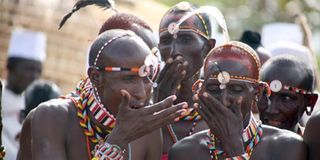Why Turkana men might need a new dance

Turkana traditional dancers entertain guests at the Turkana festival. Photo/FILE
What you need to know:
- At dusk, men dance to tunes in praise of their possessions usually livestock; now there’s oil
There is hardly a better window into the Turkana culture than the beautiful night dance performed by men under the gaze of moonlight most evenings after a hard day’s work.
Swaying rhythmically and chanting into the night with their deep voices the men, clad in resplendent traditional regalia, parade in the dance arena casting all their fears and problems away.
The songs are mostly about their possessions. And it is here that the Turkanas’ deep affinity for and pride in their livestock shines through.
The recent discovery of oil deposits has stirred interest in a region that had largely been ignored for decades.
And it also raises the prospect that, as an expected flood of investors and speculators get into the county, the culture of the region may also be fundamentally transformed for better or worse.
The love for livestock among the Turkana and neighbouring communities has its benefits – it promotes a sense of resilience and self-reliance, instilling the culture of hard work in all because a man’s worth is measured by how many cattle he can accumulate.
But it also has its prominent drawbacks, illustrated by the killing of 12 people about two weeks ago by raiders from a neighbouring county.
Lokomolimoe Lokure, an elder in Lokichar in Turkana South, says the sound of gunshots and the occurrence of frequent cross-border raids will not end even with the discovery of oil.
“As we speak now, we have received information that the Pokot are plotting an attack and are said to be somewhere behind the hills,” he said, pointing towards the direction where the would-be attackers were said to be hiding.
The news of oil discovery got them at Lotiman village where they have erected makeshift houses but are always on the lookout for possible attacks.
“Insecurity is a big issue here and one of our prayers is that the new development will lead to beefing up of security so that we can continue with our economic and social activities without constantly looking over our shoulders,” he said.
But whatever the wealth and prospects for better living standards, Mr Lokure says their way of life will remain intact because their traditions and culture are what keep them going.
For the Turkana, the single largest ethnic group in north western Kenya, life revolves around livestock keeping. Ownership of cattle, goats, sheep, camels and donkeys is the definitive mark of wealth and source of pride for men. Many people here would not sell their livestock, not even at the risk of starvation.
According to them, one’s wealth is pegged on the number of animals one has and that is why, according to Mr Lokure, parents withdraw their children from school to look after animals.
Benson Mwasa, deputy police boss of Loima District, said that livestock has literally made the Turkana a target of raids from their neighbours, yet, this nomadic tribe has never given up its passion and pride for livestock.
Eliud Emeri, the chief executive officer of Greater Turkana Civil Society Network, says it is not certain that the exploitation of oil deposits will change the nomadic Turkanas’ undying passion for livestock.
The cultural aspect underpinning cattle rustling has made the practice difficult to eradicate.
Turkana East MP Josphat Nanok says the expected huge influx of people into the area may lead to gradual change.
Mr Nanok believes that assimilation will have an impact on cultural activities. However, he adds that the government should put measures in place to protect the local residents’ interests.
Yet even as everyone in Kenya is speculating on the benefits of oil discovery in Turkana, the locals are only concerned with the intrusion of foreigners into their pasture land and water points.
Until a few years ago, when some communities started practising small- scale agriculture in irrigation schemes along Turkwel and Kerio rivers, the sole economic activity in Turkana had been weaving. Women in Lodwar and other towns weave baskets, mats, brooms and souvenirs to earn a living.
Grace Nakeno, a mat and basket trader in Lodwar, says that despite the lack of a big market, she earns enough to take care of her family of 10. Ms Nakeno started the business in 2000. Today, baskets retail at Sh 1,500, mats Sh300 and brooms Sh150 a dozen.
Besides weaving, the responsibility of building houses, searching for and preparing food and looking after children, falls on women. Men look after livestock and protect the families in case of an attack.
But even as other Kenyans hope the wells in Turkana have commercially viable oil deposits, Turkana must grapple with a myriad problems that have kept it marginalised.
Social amenities such as schools, hospitals and technology are yet to reach many in the region. A large number of the residents cannot read or write.
And, according to the Greater Turkana Civil Society Network, more than two-thirds of the population has no permanent residence. They only put up temporary homes as they move from one place to another in search of water and pasture. This makes it hard for children to attend school.
From a tender age, children are taught to live by their livestock.




